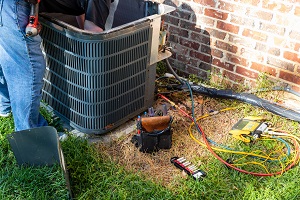
If your career interests lie in working with your hands and mind in dynamic, challenging, and diverse environments, then HVAC service work may be for you. By obtaining your training with an associate degree, you will prepare yourself to work with clients in many industries.
Of many possible places to work, three industries stand out because of their sustained growth. They include residential construction, healthcare facilities, and commercial office buildings. Let’s take a closer look at the potential for working with them.
HVAC Work: Residential Construction Is Growing
All new homes, apartment buildings, and condominiums need heating and cooling services. Existing dwellings eventually need HVAC repairs, maintenance services, and equipment or system replacement. These opportunities offer stable work in most areas.
New Construction includes installing equipment and whole systems in newly-built houses and other types of dwellings. Air conditioning, heating, humidifying, dehumidifying, thermostats, heat pumps, and fans are the common types of equipment technicians install.
Repairs and Maintenance are ongoing services for residences. They include inspecting, troubleshooting, repairing, replacing, and maintaining parts and equipment. Technicians also offer annual maintenance plans.
System Replacement entails removing and disposing of old air conditioning and heating equipment and replacing them with a new and more efficient system. HVAC systems that are 15 years old are typically considered inefficient by modern standards.
A growing trend is making your home a ‘smart home’ by installing the newest and most efficient technologies that include more effective HVAC systems.
HVAC Work: Healthcare Facilities
 Healthcare facilities such as clinics, hospitals, nursing homes, and assisted living centers need clean and regulated temperatures year-round for residents and employees. Meeting these needs for safe and comfortable environments is a must for these facilities. HVAC technicians provide services that meet all these goals, especially for seniors.
Healthcare facilities such as clinics, hospitals, nursing homes, and assisted living centers need clean and regulated temperatures year-round for residents and employees. Meeting these needs for safe and comfortable environments is a must for these facilities. HVAC technicians provide services that meet all these goals, especially for seniors.
An HVAC technician’s services are among the most important provided to healthcare facilities. You will be contributing to patients’ care in ways no one else can whether you are maintaining, repairing, or replacing old equipment with new equipment.
Your experience with ventilation systems will be invaluable to keep the air clean throughout the facilities. You may work with ventilations that use UV light to filter and sterilize air as it goes through the ductwork to each room. While your HVAC school training may not specifically train you in these devices, your experience will allow you to quickly understand them with on-the-job training.
|
“If your career interests lie in working with your hands and mind in dynamic, challenging, and diverse environments, then HVAC service work may be for you.” |
HVAC Work: Commercial Office Buildings
Perhaps the most widespread use of HVAC technologies is in commercial offices and large mixed-use buildings. Technicians typically provide these services in commercial structures:
- Maintain, repair, and replace existing parts and equipment
- Install equipment and systems in newly built complexes
- Maintain temperatures and humidity levels
- Determine the appropriate type of HVAC equipment
- Determine the best sizes and outputs of equipment
- Ventilate each room properly in the entire building
- Service and troubleshoot HVAC systems as needed
Working on HVAC systems in larger commercial office buildings requires a high level of professionalism and expertise. It provides both challenges and rewards for technicians and their supervisors. Commercial work is highly lucrative, and most technicians find it more engaging than standard residential HVAC work.
How HVAC Training Prepares You For Service Work
Earning an associate degree in HVAC prepares technicians for entry-level jobs. With experience and certification, they can elevate their job titles and incomes. Technical college training provides the knowledge and skills needed for success, including:
- Service and maintenance for HVAC and refrigeration work
- Passing the EPS section 608 test and understanding the National Electric Code
- Install, repair, and maintain a wide variety of electrical equipment
- Fundamentals of heat transfer, refrigerants, and HVAC system regulations
- Electrical safety, motor controls, basic and advanced programmable logic controllers (PLCs)
- Safe work practices and environmental awareness practice
- AC load calculations, applications, and troubleshooting of HVACR systems, wiring methods, and lighting
- Intro to Personal Computer office applications and computer networking, workplace communications, and one elective course related to each student’s interests
- Studies include classroom and laboratory work on real-world equipment
Students learn to work with equipment and system components on field-grade equipment in classroom and laboratory activities. HVAC certification exams are given during the program to allow students to obtain industry competencies in the area of HVACR. This accelerated and hands-on training program is meaningful for students who want to earn an associate degree or improve their industry skills and knowledge in their current positions.
ITI Technical College offers an Associate of Occupational Studies (AOS) in the Air Conditioning, Refrigeration, & Electrical Technology Program. The program is accredited by HVAC Excellence which ensures it meets rigorous standards and contains the necessary resources for high-quality technical education.
For more information about graduation rates, the median debt of students who completed the program, and other important information, please visit our website: https://iticollege.edu/disclosures/





